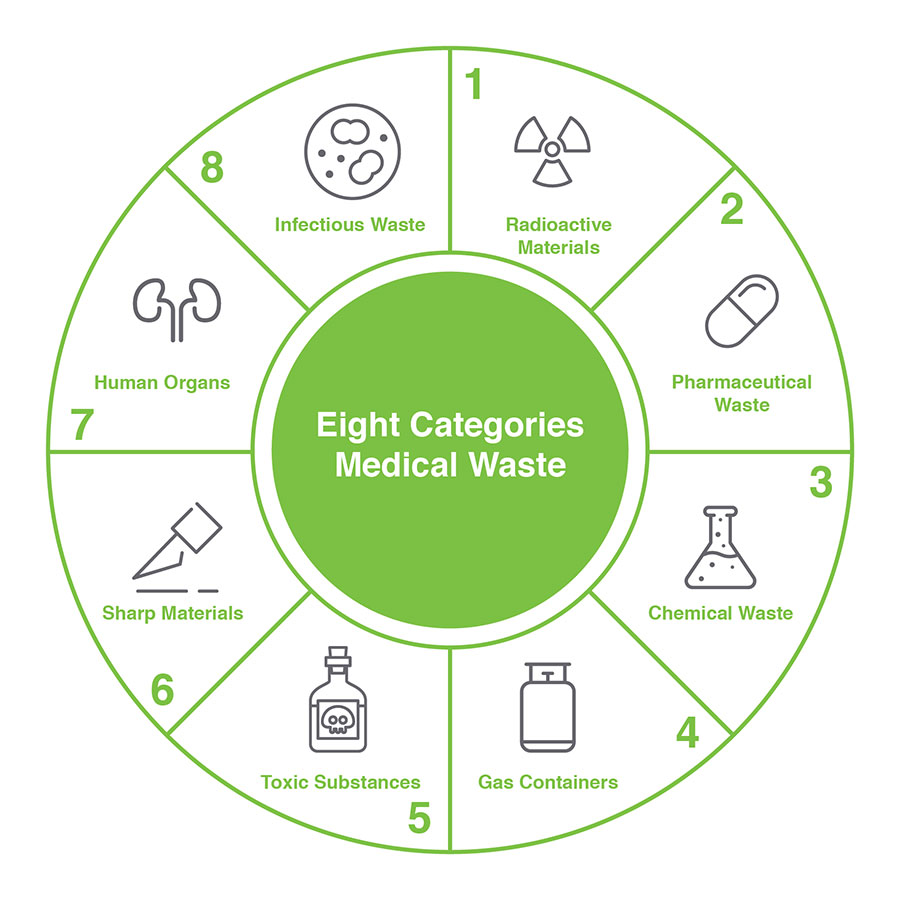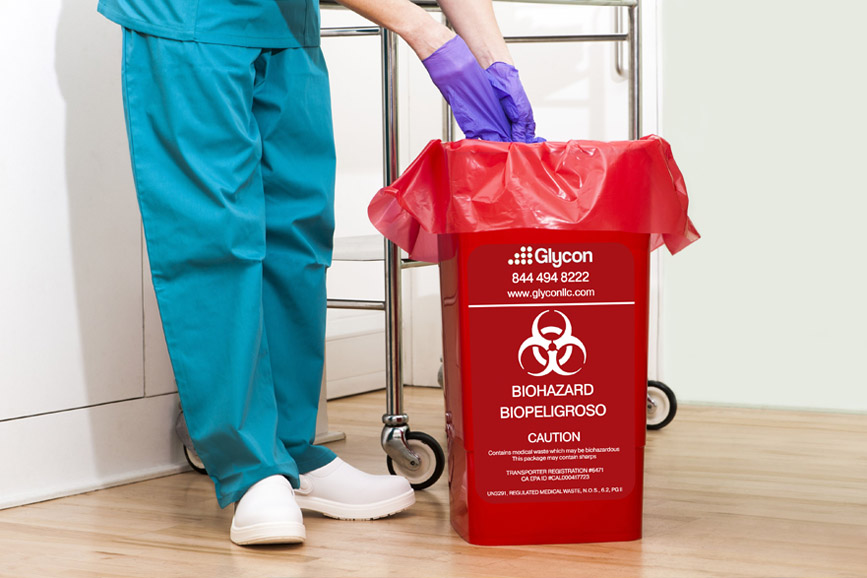Remain Ahead of Rules: Expert Recommendations on Medical Garbage Disposal
In a globe where the medical care market is frequently progressing, it is necessary for clinical centers to remain ahead of laws when it comes to the proper disposal of clinical waste. From understanding the different groups of clinical waste to executing the best collection and segregation techniques, this discussion will supply beneficial insights and actionable suggestions to assist centers remain in advance of policies in the ever-changing landscape of medical waste disposal.
Recognizing Clinical Waste Categories
Recognizing medical waste categories is necessary for appropriate disposal and monitoring in healthcare facilities. Medical waste refers to any type of waste generated by healthcare tasks that may pose a threat to public health or the environment. It is essential to categorize clinical waste properly to ensure its risk-free handling, therapy, disposal, and transportation.
There are several classifications of clinical waste that healthcare facilities require to be knowledgeable about. One of the most common groups consist of infectious waste, pathological waste, sharps waste, pharmaceutical waste, and chemical waste. Each group has particular standards and laws for its appropriate monitoring and disposal.
Infectious waste consists of materials polluted with blood or other bodily fluids, such as gloves, gowns, and research laboratory societies. Pathological waste refers to human cells, body organs, or body parts that call for special handling and disposal. Sharps waste consists of utilized needles, syringes, and various other sharp objects that can cause injury and send infections. Pharmaceutical waste consists of run out, unused, or infected medicines that need cautious handling and disposal. Chemical waste consists of solvents, anti-bacterials, and other chemical compounds made use of in healthcare facilities.
Staying Up-To-Date With Regulatory Adjustments
Staying existing with governing modifications is vital for health care facilities to ensure compliance and proper administration of medical garbage disposal. medical waste removal. With laws frequently developing, it is vital for healthcare centers to remain up-to-date to prevent charges, penalties, and potential damage to the atmosphere and public health
To stay in advance of regulative adjustments, medical care centers need to develop a system for surveillance and monitoring updates. This can be done by registering for regulatory newsletters, going to workshops and meetings, and actively getting involved in industry organizations. In addition, facilities need to assign a staff participant or group in charge of staying educated and sharing info to appropriate stakeholders.
Routine interaction with governing agencies is additionally crucial. Healthcare centers need to establish connections with local, state, and federal agencies to guarantee they understand any type of changes in policies that may impact their waste management practices. This can be done through routine meetings, engagement in public comment periods, and positive engagement with regulative firms.
In addition, healthcare centers must consider partnering with waste management firms that focus on medical garbage disposal (medical waste disposal services with WasteX). These business are usually skilled in the most recent laws and can offer advice and support to make certain compliance
Executing Proper Collection and Partition Approaches
To efficiently take care of medical waste disposal, healthcare centers must develop proper collection and partition methods in conformity with governing standards. Executing these approaches guarantees the safe handling and disposal of potentially unsafe materials, shields the setting, and lessens the risk of infections and injuries to medical care workers and the public.
Appropriate collection and segregation methods entail the use of marked containers and identifying systems. Healthcare centers should supply clearly labeled containers for various types of clinical waste, such as sharps, infectious waste, pharmaceutical waste, and non-hazardous waste. These containers should be color-coded and clearly significant to stay clear of complication and advertise simple identification.
Furthermore, healthcare facilities ought to educate their personnel on the proper treatments for accumulating and segregating medical waste. This includes informing them on the different kinds of waste, the appropriate containers to make use of, and the relevance of following guidelines and guidelines. Routine training sessions and correspondence course need to be performed to make sure that employee remain current on ideal techniques.
In addition, medical care facilities should develop a system for regular collection and disposal of clinical waste. This may entail partnering with licensed waste administration business that concentrate on medical garbage disposal. These companies will certainly make sure that the collected waste is transferred and gotten rid of in compliance with governing requirements.
Choosing the Right Disposal Approaches

Incineration is one of the most effective and usual approaches for dealing with particular kinds of clinical waste, such as pathological waste YOURURL.com and sharps. It involves the controlled combustion of waste at heats, lowering it to ash. Nevertheless, incineration can release hazardous contaminants into the air and add to air pollution.

Other disposal techniques include chemical treatment, microwave therapy, and landfilling. Chemical therapy includes using chemicals to neutralize the waste and sanitize. Microwave therapy uses microwave energy to heat and sanitize the waste. Landfilling entails hiding the waste in an assigned landfill location (medical waste disposal services with WasteX). However, landfilling should be the last hotel because of the possible risk of contamination to soil and groundwater.
Guaranteeing Conformity Through Paperwork and Training
After meticulously taking into consideration the appropriate disposal approaches for clinical waste, health care centers need to make sure conformity with guidelines and minimize environmental influence by executing efficient documents and training procedures. This step is vital in keeping a risk-free and sustainable atmosphere for both healthcare workers and the public.

Healthcare workers who manage clinical waste ought to receive suitable training on waste partition, dealing with, and disposal treatments. By giving extensive training, healthcare centers can encourage their team to make educated these details decisions and reduce the risk of incorrect waste disposal.
Conclusion
To conclude, remaining in advance of guidelines in clinical waste disposal is critical for healthcare facilities. medical waste removal near me. Comprehending the various categories of medical waste, staying updated with regulatory modifications, carrying out correct collection and segregation approaches, picking the appropriate disposal techniques, and ensuring conformity through documentation and training are all crucial steps. By complying with these standards, medical care organizations can properly get rid of and manage of medical waste in a risk-free and liable way
From understanding the different categories of medical waste to implementing the appropriate collection and partition techniques, this conversation will give important insights and actionable pointers to assist facilities stay ahead of regulations in the ever-changing landscape of medical waste disposal. - medical waste disposal services with WasteX
The most usual groups include contagious waste, pathological waste, sharps waste, pharmaceutical waste, and chemical waste. Health care centers ought to supply plainly classified containers for different types of medical waste, such as sharps, transmittable waste, pharmaceutical waste, and non-hazardous waste. Health care centers need to develop a detailed system to videotape and track all elements of More Bonuses medical waste disposal, consisting of types of waste generated, quantities, and disposal approaches made use of. Health care workers who deal with clinical waste ought to obtain appropriate training on waste partition, dealing with, and disposal treatments.